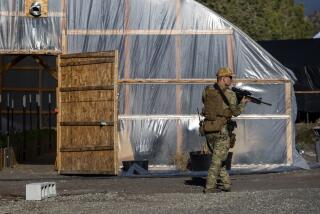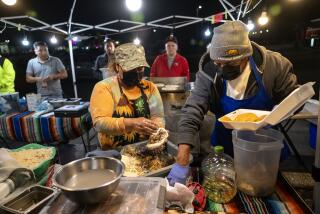Drug prohibition doesnt work
This week, The Times featured yet another story about a drug bust gone bad. Los Angeles County sheriff’s deputies detained 32 African American students and one Latino student at Los Angeles Trade Tech College in an attempted undercover raid. The sting operation was done on the Sheriff’s Department’s initiative, without the knowledge of campus officials. Criticisms of this action alleged racial profiling.
Some questions remain unasked: Why was this particular college targeted for a narcotics search operation? How could the Sheriff’s Department be unaware of the racial makeup of the school? And why detain everyone present at the scene? Considering that there is significant evidence to suggest that the enforcement of drug prohibition is racist, what inspired this operation’s target location is a pertinent concern. After all, if deputies were sent into almost any college (even an Ivy League one) in search of controlled substances, they would likely find them. The deputies’ actions in detaining everyone in sight are akin to losing a hit-and-run suspect on a highway, and responding by pulling over everyone. The police generally know better than to do this, but reason loses out in pursuing drug prohibition.
Shouldn’t we learn from the mistakes of the past, like the Goose Creek Raid in South Carolina in 2003, in which high school students primarily minorities were ordered on the ground at gunpoint, and some students were handcuffed, even though police had no probable cause and found no drugs? History dictates that prohibition doesn’t work. Contemporary implementation proves it: Our drug prohibition policy has never been successful, and in fact has made our society collectively worse.
Racial profiling by those who are charged with protecting and serving us is added to a laundry list of harms such as our police acting like an occupying army, regularly kicking in doors armed with assault weapons and wearing combat armor, or the millions of people, primarily minorities, arrested and processed into a revolving door of criminal “justice.” Drug prohibition has created black markets, underground economies that generate no taxes and resort to illicit, even violent, means of handling trade disputes. The money involved is vast and is used to corrupt our politicians and police, purchase weapons for disputes and fund terrorist activity.
Prohibition’s primary argument, protecting our children, fails as well. Black markets mean trade takes place wherever it’s most convenient or covert no one sells alcohol on school campuses, yet illicit drugs are regularly made available there. Prohibition, by design, places children in danger, by ensuring that homes and schools are used as avenues of drug distribution, rather than hospitals, pharmacies, and stores places where regulation could be enforced easily.
It’s time to stop drug prohibition and start looking at realistic ways to deal with drug use, abuse, manufacture and distribution. Regulation is one such path. People aren’t killing each other over tobacco or alcohol, and both are medically proven to have detrimental effects. Neither are drinkers and smokers clogging our criminal justice system, or distracting our police force from violent offenders. We can change paths and try to help not hurt each other.
Malakkar Vohryzek is an administrative associate with the Drug Policy Alliance.
More to Read
A cure for the common opinion
Get thought-provoking perspectives with our weekly newsletter.
You may occasionally receive promotional content from the Los Angeles Times.






